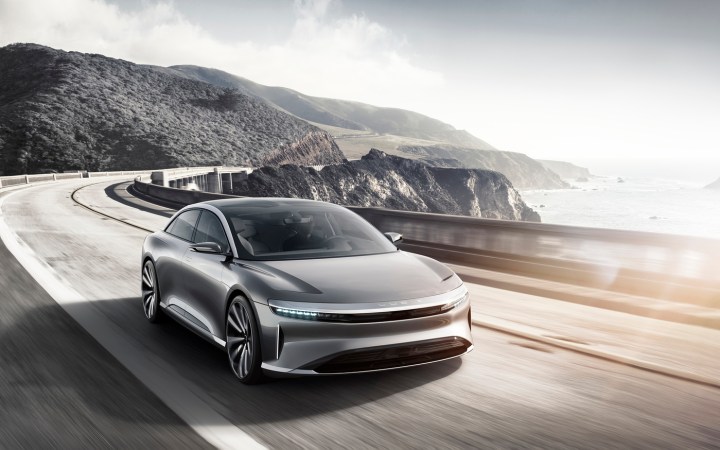
While a fully optioned Air will cost more than $100,000, the base model will start at $52,500, Lucid confirmed on Wednesday. That’s after the $7,500 federal tax credit for electric cars is applied, so the true base price is an even $60,000. With that savings come some more down-to-earth performance figures.
Dual-motor all-wheel drive will be available on certain versions of the Air, but the base model is rear-wheel drive only. It has 400 hp, and a 240-mile range, Lucid says. That’s not as spectacular as 1,000 or 400 miles, but the range figure is at least a bit of an improvement over the base Tesla Model S 60’s 210 miles. The Tesla also costs about $10,000 more.
Base models will be equipped with “all hardware necessary for autonomous driving,” according to Lucid. Other standard features on the base Air will include power seats, four display screens (including three touchscreens), 19-inch wheels, a 10-speaker audio system, and 10 airbags. Like Tesla, Lucid plans to offer periodic over-the-air software updates to add features to its cars.
From there, Lucid will offer options like 315-mile and 400-mile battery configurations, the aforementioned 1,000-hp all-wheel drive powertrain, active suspension, a glass roof, and rear “executive” seats that recline up to 55 degrees. Adding every option takes the price over $100,000.
Lucid is taking reservations, which require a $2,500 deposit, but deliveries won’t begin until 2019. The first 255 cars will be special “Launch Edition” models, with the 315-mile battery, 1,000-hp powertrain, and some other niceties. Lucid expects to deliver 10,000 cars in the first year of production. First, though, it has to build a factory at the site in Casa Grande, Arizona it chose last year.


